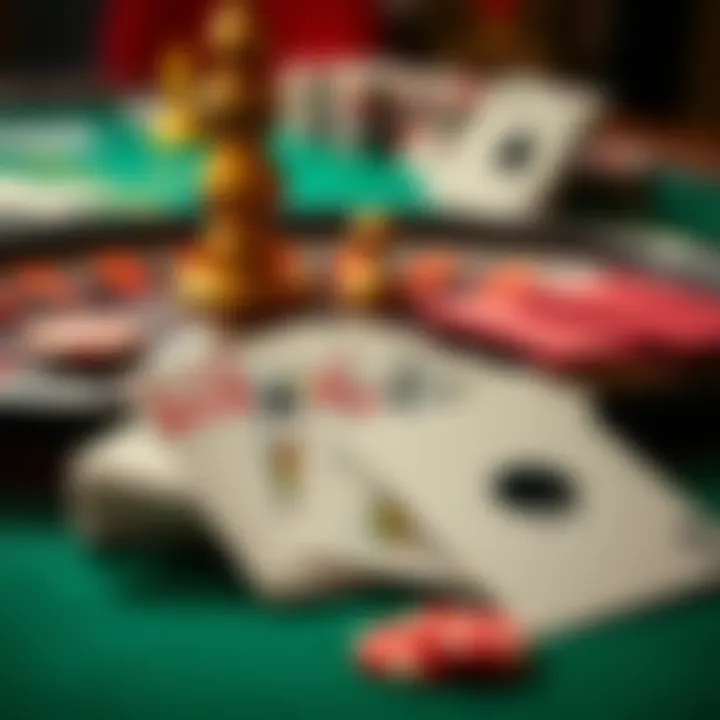The Intriguing Blend of Roulette and Card Games


Intro
The realm of gambling is a dynamic intersection where chance meets skill. Among the vibrant offerings found in casinos, roulette and card games stand out, each with unique nuances but also shared characteristics. This exploration peeks behind the curtain, revealing how the mechanics and strategies of these games intertwine, creating a richer experience for those who seek both nuance and excitement. Whether you prefer the spinning wheel of roulette or the tactical maneuvers of card games, understanding their interplay can elevate your overall gaming experience.
Betting Strategies
For players keen on gaining an edge at the gaming table, choosing the right betting strategy is crucial. Just as a chess player assesses possibilities before making a move, gamblers must consider their betting options to maximize potential returns while minimizing risks.
Types of Betting Systems
There’s a whole toolbox of betting systems at one’s disposal, each with its own philosophy and methodology. Let’s take a closer look:
- Martingale System: This method suggests that players double their bet after every loss, aiming to recover previous losses with a single win. While simple, it requires a substantial bankroll and can be risky, especially when hitting table limits.
- Fibonacci Sequence: Utilized by more analytical players, it relies on the famous sequence where each number is the sum of the two preceding ones. This system allows for a slower progression in betting amounts, often making it more sustainable over the long haul.
- D’Alembert System: This approach suggests increasing stakes after a loss and decreasing them after a win. Unlike Martingale, it's less aggressive and may prove less financially damaging over time.
Mastering these systems can be akin to learning different chess openings; their effectiveness often depends on the individual player’s style and comprehension of the game.
Common Mistakes to Avoid
While strategies can enhance gameplay, certain pitfalls can derail even the most seasoned players:
- Chasing Losses: Losing streaks can lure players into throwing good money after bad. Accepting a loss is part of the game; it's essential to know when to step away.
- Ignoring the House Edge: Each game has its own odds. Roulette, for example, comes with a house edge that can vary dramatically based on the type of bet placed. Ignorance can lead to poor decisions.
- Getting Set in Your Ways: Sticking to one strategy blindly can be detrimental. Adaptability plays a pivotal role in gambling, much like adjusting your tactics in any competitive situation.
In essence, understanding and smartly applying betting strategies can transform the casual player into a formidable opponent at the table.
Epilogue
As we navigate through the intricate tapestry connecting roulette and card games, the betting strategies employed form the backbone of effective gameplay. Knowledge of these strategies, alongside an awareness of common pitfalls, and a structured approach can greatly amplify the player's experience, inviting deeper engagement with these timeless games.
Preamble to Roulette and Card Games
The world of gambling is a fascinating amalgamation of chance, strategy, and sometimes sheer luck, which makes the examination of roulette and card games particularly relevant. Both forms of gaming have captivated players for centuries, but the unique interplay between these two genres adds layers of complexity and excitement.
Roulette offers a sensory experience, with its spinning wheel and vibrant colors creating an atmosphere of anticipation. At the same time, card games like poker rely heavily on strategy and psychological warfare among players. This article delves deep into this intersection, unearthing how they not only coexist but enhance each other in numerous ways.
Why This Matters
Understanding the relationship between roulette and card games can enrich one’s gambling experience. By exposing players to the varying dynamics of both formats, they can better navigate game mechanics, hone their strategies, and elevate their overall enjoyment.
Moreover, the rise of online gaming platforms has allowed for innovative hybrids, blending elements of roulette and card play in ways that were previously unimaginable. This article aims to highlight these shifts in gaming paradigms, as well as the societal implications that come with them.
Defining Roulette
Roulette is a casino staple, characterized by its wheel divided into numbered slots and a small ball that determines winning bets. The basic premise is simple: players place their wagers on a table reflecting possible outcomes, then wait for the wheel to spin and the ball to settle.
Types of Bets
There are different types of bets players can make:
- Inside Bets: Wagers placed on specific numbers or small groups of numbers.
- Outside Bets: These cover broader categories, like red/black or odd/even.
- Call Bets: These involve betting on a group of numbers based on their layout on the wheel.
Game Variations
There are several variations of roulette, including American and European versions, each with its own distinct rules regarding the wheel’s configuration and house edge. This underpins the strategy players employ, especially when integrating card gameplay into the mix.
Understanding Card Games
Card games, on the other hand, form a different facet of gambling. They often involve players competing against one another, rather than against the house, creating a layered game of skill and psychology.
Types of Card Games
Among the myriad of card games, poker stands out as one of the most popular due to its complex strategy and psychological aspects. Meanwhile, blackjack focuses on beating the dealer, blending elements of strategy and chance. These nuances set them apart from roulette, where players are more passive spectators.
Game Mechanics
In card games, players must consider factors such as probabilities, hand values, and the tendencies of their opponents, which complicate the decision-making process. Successfully navigating these factors leads to an enriched experience, particularly when one employs strategies akin to those in roulette.
The interplay between these games may not be immediately obvious but becomes more pronounced as we explore further transitions in play styles, bet structures, and even the psychological elements engaging players.
Overall, this journey into the convergence of roulette and card games holds the potential to deepen the understanding of how they can complement each other.
The Mechanics of Roulette
Understanding the mechanics of roulette is pivotal to appreciate its uniqueness and the strategies involved in both this game and its relationship with card games. The interplay of chance and skill in roulette offers insight into how players can navigate their betting decisions. Additionally, recognizing the layout and types of roulette games equips players to make informed choices. This section will illuminate these elements, focusing notably on how they can change a player's approach to the game.
Roulette Wheel and Table Layout
The roulette wheel, a striking feature of the game, consists of numbered pockets ranging from 0 to either 36 or 37, depending on the type of game being played. The arrangement matters a great deal. Balls spin on the wheel with the ultimate fate resting in chaos's hands, yet the table layout contributes significantly to gameplay strategies.
Players make their bets on a specially designed table, which showcases all the numbers and betting options. This layout is more than a mere presentation; it directly influences betting behavior.


- Inside Bets: These bets focus on specific numbers. They carry a riskier nature yet provide higher payouts. The temptation of striking gold keeps many gamblers on this wagon.
- Outside Bets: Contrary to their inside cousins, outside bets cover larger groups of numbers or outcomes, yielding lower but steadier payouts. Here, players may bet on colors, odd/even outcomes, or groups of numbers—allowing for a more conservative approach to risking one's chips.
Ultimately, becoming familiar with the table layout can enhance a player's strategic outlook. Knowing which bets hold higher odds or lower payouts empowers players to make decisions that align with their risk tolerance.
Types of Roulette Games
Roulette doesn't stop at a single version; it comes in several forms, each with its own unique flair. Understanding these variations provides context — it helps players see the bigger picture of how strategy and rules can change across formats.
European Roulette
European Roulette is well-known for its single zero format. This simplicity is a key contributor to its popularity, presenting better odds for players than its American counterpart. The unique feature here is the lower house edge, which stands at around 2.7%. This encourages players to engage with the game long-term without feeling like they’re constantly battling against overwhelming odds.
- What makes it a popular choice: The lower house edge signifies more favorable conditions for players, leading them to gravitate towards this format. Plus, the game offers a thrilling experience without convoluted rules, which adds to its charm.
American Roulette
Turning to American Roulette, we meet a different beast with a double zero on the wheel. This offers a slightly higher house edge of about 5.26%, which can deter some players. However, it carries a unique mystique, appealing to those enjoying a bit more risk-takin'.
- Key characteristic: The double zero introduces a layer of complexity to betting strategies. While it is a more daunting choice for some, the added risks can also entice seasoned players who love to walk the tightrope of chance against reward.
French Roulette
French Roulette is somewhat of a beautiful blend. While similar to European Roulette, it includes additional rules like
Integrating Cards into Roulette
Integrating cards into roulette introduces a dimensional interplay between chance and strategy, expanding the typical gaming experience. By merging elements of both genres, players can find new layers in their gameplay. This fusion allows for not only diversification in betting strategies, but it also tantalizes the minds of those who appreciate the tactical nature of card games while enjoying the thrill of spinning the wheel.
Concept of Roulette with Cards
The concept of roulette with cards reshapes traditional rules by introducing a deck of cards into the classic betting scenario. When you think about it, this combination gives players opportunities to utilize familiar card strategies while playing a game predominantly based on luck. This hybrid form often involves betting on not just the numbers on the wheel but also on the values presented in a card deck. For instance, players may choose to bet on a specific card resulting from a drawn hand that corresponds to outcomes on the roulette table.
Such a concept provides an avenue for players to engage in more complex bets. Those who might feel like pure roulette lacks tactical depth can now find themselves devising strategies around card probabilities, which adds another layer of strategy and excitement.
Further, there are many innovative variations of this concept. One such example is 'Roulette Poker,' where players utilize both the roulette wheel and poker hands to make their bets. This results in a unique point structure that can attract casual players and seasoned veterans alike, as they juggle their understanding of both roulette odds and traditional poker strategies.
How Cards Influence Outcomes
Cards play a pivotal role in shaping the outcomes in a roulette game that incorporates them. While the foundational mechanics of roulette hinge on the unpredictability of the ball landing on a number, the presence of cards introduces a strategic layer where decision-making becomes crucial.
- Decision-Making: Players can influence their betting strategies based on known card combinations. For instance, if players realize certain cards are overrepresented in a deck, they could adjust their bets to reflect what they think is more probable when integrated with roulette results.
- Probability Adjustments: Unlike standard roulette, where each spin is isolated from previous results, card integration may allow for certain probabilities to play a role. If certain cards have appeared frequently, folks might bet differently hoping for similar results to occur again.
- Player Interaction: Moreover, the interaction among players becomes richer in a card-integrated roulette game. Competitors might read each other's betting patterns, trying to gauge the other's hand and adjust their bets accordingly.
"When cards enter the picture, roulette isn't just a game of chance anymore—it's a strategic playground."
To further grasp these concepts, you may explore resources such as Wikipedia on Roulette or forums like Reddit's Online Gambling Community. These platforms often provide insights into evolving games and strategies that can elevate your experience.
Strategies for Combining Roulette and Card Games
The world of gambling is filled with a myriad of strategies, some focused on specific games while others encompass multiple formats. Understanding how to effectively combine strategies from roulette and card games can significantly impact a player’s experience and potential outcomes. This section dives into the fundamentals of this amalgamation, laying out the basic betting strategies, card counting techniques, and the variances you need to consider when navigating these different betting systems.
Basic Betting Strategies
Basic betting strategies in both roulette and card games have their roots in math and probability. It’s about knowing when to put your chips on the table and when to hold back. In roulette, players often utilize the Martingale strategy where you double your bet every time you lose, aiming to recover previous losses. On the card game side, techniques like flat betting can be employed—this involves betting the same amount every time, minimizing risk in the long term.
- Utilize a combination of bets: In this merging of strategies, players can alternate between fixed bets in card games and variable bets in roulette to balance risk and reward.
- Set specific win and loss limits: These limits can help players remain disciplined, preventing the emotional rollercoaster that often accompanies gambling.
Strategically combining these methods can serve to make your gaming experience more versatile. You may discover that a game of blackjack influences your roulette bets based on your action sequences.
Card Counting Techniques
Although card counting is widely recognized in games like blackjack, adapting these techniques to a roulette environment requires insight into the sequences of bets. The simple act of tracking which numbers land most frequently could yield strategic advantages. Here’s how to embrace card counting nuances in your roulette game:
- Maintain a mental tally: Paying attention to the numbers that have hit frequently can inform your betting choices, similar to how you would tally cards. If certain numbers are trending, you might choose to place outside bets on those or increase your stake.
- Consider the dealer's tendencies: Just as with cards, certain dealers may have patterns that affect outcomes too, whether consciously or unconsciously. By observing these trends, a player can place their bets accordingly.
While card counting has its limitations in roulette, the very practice sharpens focusing skills and heightens awareness, crucial traits when engaging with any game of chance.
Variance in Strategies Across Game Types
When blending strategies from roulette and card games, it's imperative to recognize how different games necessitate different approaches. For instance, while roulette presents a straightforward betting format, card games often entail more complex decision-making processes.


- Common Themes: Both rely on probability, but how each game scales that probability varies significantly. In roulette, the house edge is a constant, but in card games, the player’s decisions can sway the odds.
- Adapting to Game Mechanics: For card games, understanding hand values, and when to hit or stand, can fundamentally change outcomes. In roulette, recognizing which bets provide better odds—like even-money bets versus single number bets—shows a different strategic layer.
Strategies must evolve to fit the unique ecology of each game. As a player, experimentation could lead to discovering personalized betting systems that encapsulate both card play and roulette, paving the way for a unique gameplay experience.
Psychological Elements in Betting
The realm of gambling is more than just numbers and cards; it's a complex dance of psychology that drives much of the decision-making process. Understanding the psychological elements in betting not only enriches our comprehension of games like roulette and card games but also illuminates how these elements can heavily influence player choices and behaviors. Players might think they are acting solely on logic, but emotions and cognitive biases often hold the reins. This section dives into the core aspects, focusing on the interplay of risk and reward, along with the emotional nuances that color each betting decision.
Risk versus Reward in Gaming
In the world of gambling, the thrill typically revolves around the delicate balance of risk versus reward. Players are often faced with the choice of playing it safe or going all in - a decision that is rooted in both personal risk tolerance and the perceived value of potential gains. Some players are more inclined toward high-risk bets, swayed by visions of enormous payoffs. Others might play conservatively, weighing their options and considering their budget. This dichotomy speaks volumes about individual psychology.
- Risk-takers are often driven by excitement and a desire for adrenaline, something that roulette and high-stakes card games can deliver in spades.
- Conversely, the more conservative player seeks to extend their time at the table, perhaps finding joy not just in winning, but also in the general experience of play.
Research shows that the brain’s response to risk can vary widely among individuals. For instance, studies have indicated that environments rich in uncertainty might heighten dopamine levels, enhancing the feeling of pleasure when risk leads to reward. This psychological state can lead players down a rabbit hole, where chasing losses becomes commonplace, often blinding them to the reality of their financial situation. Recognizing this pattern can be pivotal in managing one’s betting behavior.
The Role of Emotion in Decision Making
Emotions are more than just fleeting feelings; they are powerful forces that shape decisions, particularly in situations laden with chance like gambling. The emotional stakes tied to betting can often cloud judgment, leading players to make choices that reflect their feelings rather than rational assessments.
When players experience excitement or hope during a game, it can lead to impulsive decisions, a phenomenon often referred to as "gambling myopia." In simpler terms, when the thrill escalates, the ability to process information diminishes. This impairment can result in:
- Ignoring odds and probabilities in favor of gut feelings.
- Downplaying previous losses or chasing them instead of resting on past results.
- Exhibiting overconfidence after a win, leading to bigger and riskier bets.
"Gambling isn't just about luck or skill; it's a conversation with oneself, where emotions play a leading role."
Recognizing the emotional pull can serve players well. With awareness, individuals can take a step back and assess their emotional state before diving into betting. Techniques such as mindfulness or setting time limits on games can help combat impulsive behavior fueled by emotion.
Historical Context of Card and Roulette Games
Understanding the historical context of both roulette and card games is crucial for grasping their significance in the world of gambling. These games are not just mere chance exercises; they carry the weight of centuries of social development, cultural perceptions, and economic impact. When players engage in these games, they aren’t just rolling dice or flipping cards—they are partaking in a tradition deeply rooted in human history, echoing the emotions and experiences of countless individuals who came before them.
Evolution of Roulette
Roulette's colorful past traces back to the 18th century when it emerged in France, though its precise origins may be attributed to earlier games like the Italian ‘Il Ridotto’ and the English ‘E.O.’. The game sits at the heart of European gambling culture, evolving significantly over time. Initially, roulette featured a single zero wheel, enhancing its appeal among gamblers seeking better odds. The introduction of the double zero at American casinos later changed the game entirely.
As players flocked to the tables, roulette became a symbol of sophistication and luck. Legends abound about famous players, such as Charles Wells, who famously "broke the bank" at Monte Carlo. Notably, these narratives have not only endured but have integrated into contemporary gambling lore, still influencing the world of betting today. The evolution continues as online platforms bring roulette into the digital realm, presenting unique variations like speed roulette and live dealer versions, allowing players to experience the thrill from the comfort of their homes.
"Roulette is the epitome of chance, yet it weaves a complex tapestry of destiny, weaving histories of fortune with each spin."
The Development of Card Games
Card games boast an equally rich heritage, dating back to 9th century China, where they were used for both entertainment and gambling. As these cards traveled across continents—through the intricate trade routes—they adapted and evolved, giving rise to a plethora of versions. The tarot cards of Italy and the French playing cards, recognizable today by their suits, are just the tip of the iceberg.
In Europe, card games flourished during the Renaissance, revealing their multifaceted nature as tools for both gaming and social interaction. The rise of specialized games like poker and blackjack brought forth nuanced strategies and a shift in gambling culture—turning card games into venues of deception, skill, and high stakes.
Its development led to professional tournaments in poker, where strategies like bluffing and reading opponents became key to success. The social dynamics introduced in card games fostered a sense of community or rivalry, impacting how players perceive risks and rewards. Furthermore, with the advent of the internet, the transition to digital formats has allowed more people to explore card gameplay, making it accessible and often more engaging.
Together, roulette and card games represent not just games of chance but rather a mirror reflecting society’s evolving views on luck, risk, and consumption. Each spin and shuffle becomes a connecting thread to a shared cultural narrative, rich with lessons and anecdotes, revealing a profound interplay between chance, choice, and human behavior.
Variations and Alternatives
In any conversation about gambling, the topic of variations and alternatives stands out. These facets are not just minor details but pivotal parts that shape how players experience both roulette and card games. The way in which these options expand the gaming universe is significant, inviting players to explore different dimensions and apply varied strategies. This section delves into alternative betting games and hybrid game formats, highlighting their growing importance in the modern gaming landscape.
Alternative Betting Games
Alternative betting games range from traditional games given a twist to entirely new inventions crafted for fresh experiences. They offer unique mechanics that deviate from the classic roulette and card combinations. Here’s a look at a few noteworthy examples:
- Pachinko: Originating in Japan, this game combines elements of slot machines and pinball. Players aim to shoot small metal balls into the machine, hoping to earn more in return. It’s flashy, it’s fast-paced, and it holds a distinct charm that appeals to many. The link between chance and skill adds extra layers for those strapped in for the ride.
- Casino War: This game is almost child’s play. Players compete against the dealer by simply comparing card values. The straightforwardness is what draws players in, yet it can quickly evolve into high-stakes tension. It captures that essence of card games but can easily adopt roulette-like betting strategies.
- Monkey in the Middle: A game where a mix of players bet on an outcome based on card selections but is presented in a more casual, social setup. It fosters an environment of laughter and camaraderie rather than pure competition.
Alternative games such as these refresh what players might find stale or predictable in traditional gambling. They require different mentalities and strategies, offering essential diversity to any player’s experience.
Hybrid Games: The Future of Betting
The notion of hybrid games is taking the gambling world by storm. These games sit at the delightful crossroads between two familiar domains: card games and roulette. The blending of these genres can captivate players looking for something new. With the technology available today, the ability to create dynamic new gaming experiences has skyrocketed.
One prime example is Poker Roulette. Here, players are dealt cards while a roulette wheel spins in tandem. The cards determine the outcome, yet players must also place bets on the wheel results. The amalgamation of strategies from both worlds allows for enhanced thrill and excitement. In this format, players experience the strategy of poker while still relishing the suspense of roulette.
Addressing the relevance of hybrid games, several key benefits spring to mind:


- Engaged Players: Players are often more engrossed in hybrid formats due to the dual strategies and choices available.
- Increased Skill Variety: This format allows for individuals with different skills to play together, mixing strategic thinking with luck—further diminishing the barriers of entry for casual players.
- Innovation: Hybrid games signal a push towards innovation in the gambling space, showcasing creativity and adaptability as essential elements for the future.
Hybrid formats embody a new chapter in gambling—where unpredictability meets skill, promising an interactiveness not previously explored.
The realm of variations and alternatives in roulette and card games presents a vibrant landscape filled with potential. Embracing these options not only enriches players’ experiences but also perpetuates the cycle of innovation within the gambling industry.
Considerations for Responsible Gambling
In the world of betting, where the thrill of the game can sometimes overshadow prudent decision-making, being aware of responsible gambling practices is critical. This section sheds light on the necessity of maintaining control in our gambling activities, especially as it relates to the interplay between roulette and card games. By addressing specific elements such as setting limits and recognizing problem gambling signs, we aim to empower players to engage in a safer gambling experience.
Setting Limits and Boundaries
One of the most effective strategies for responsible gambling involves setting personal limits. Players should define how much time and money they're willing to spend on games before diving in. This can prevent a casual outing from turning into a financial pitfall.
It's important to clarify these limits:
- Time Boundaries: Determine how long you plan to enjoy your gaming experience. Whether it’s an hour or an evening, stick to your schedule.
- Financial Limits: Decide on a budget beforehand. Setting a cap -whether it's daily, weekly, or monthly- can act as a safety net. Once you've reached this limit, walk away.
Moreover, taking advantage of tools provided by casinos or online platforms can be beneficial. Most gambling sites allow players to set deposit limits, session durations, or even self-exclude for a time period. This demonstrates a commitment to responsible gaming, assuring that enjoyment doesn't spiral into chaos. By establishing these boundaries, you take control, steering clear of impulsive decisions that might lead to regret.
Recognizing Problem Gambling Signs
Recognizing the signs of problem gambling is fundamental for ensuring a healthy relationship with betting. Ignoring these signals can lead to severe consequences, not just financially, but emotionally and socially. Here are some common indicators:
- Preoccupation with Gambling: Constantly thinking about past gambling experiences or planning the next betting session.
- Chasing Losses: Trying to win back money that has already been lost can be a slippery slope.
- Neglecting Responsibilities: If gaming starts to interfere with work, relationships, or daily obligations, it's time to reassess.
- Feeling Anxious or Depressed: Experiencing mood swings or changes in emotional well-being linked to gambling behavior can indicate a deeper issue.
If any of these signs resonate, it may be wise to reach out for help. Consulting with a professional or even talking to trusted friends can shed light on the situation. Support groups are also available, providing a platform for sharing experiences and gaining insight from others who have faced similar challenges.
"Gambling can be a thrilling pastime, but recognizing when pleasure turns to peril is crucial for maintaining a balanced approach to betting."
Educating oneself about responsible gambling is not merely advisable; it is essential. This awareness fosters not only personal accountability but also contributes to the broader community flourishing in a more respectful gambling environment. Through recognizing the importance of setting limits and identifying problem signs, players position themselves to enjoy the excitement of roulette and card games responsibly.
Cultural Perceptions Surrounding Roulette and Card Games
The way societies view roulette and card games plays a significant part in shaping the gaming landscape. These perceptions often dictate player engagement, community attitudes, and even regulations surrounding gambling. This section digs deeply into how culture influences the gameplay experience and the societal implications of these games.
Betting and Society
The relationship between betting and society is intricate and multi-faceted. Historically, gambling has faced periods of acceptance and rejection, influencing how players engage with games like roulette and card-focused gambling. In many cultures, placing bets is seen not merely as a chance to win some money but as a communal activity.
For example, in places like Las Vegas, gambling is woven into the fabric of entertainment. It’s not uncommon for friends or families to gather at a roulette table, pooling their excitement and hopes as the ball dances around the wheel. Such environments foster a sense of camaraderie and shared experience, transforming a potentially isolating activity into one filled with social interaction.
In contrast, in some regions, gambling is often regarded with skepticism or outright condemnation. The stigma can be influenced by religious beliefs, legal frameworks, or historical perspectives. For instance, in many conservative societies, engaging in any form of gambling might be deemed immoral, making individuals feel ostracized if they're caught betting. This societal scrutiny can significantly temper people's willingness to participate in roulette or card games, regardless of the potential thrill they offer.
"The societal landscape regarding gambling is complex, with nuances that vary dramatically across cultures, affecting how individuals choose to participate in games like roulette and poker."
Stigmas Attached to Gambling Activities
The stigma surrounding gambling often clouds the conversation surrounding roulette and card games. Many individuals who enjoy these games face whispers or judgment, often categorizing them as misfits or reckless. Rather than being considered hobbies or leisurely activities, they can be viewed as signs of poor financial responsibility or addictive behavior.
Begging the question: why does this stigma exist? One reason lies in the historic connotations of gambling as a vice, something associated with excess, irresponsibility, and even crime. Media portrayals have also played a role, often painting a bleak image of gamblers driven by desperation or greed, which stands to tarnish the gaming community.
Understanding this stigma is essential for a well-rounded view of betting cultures. Discussions on responsible gambling often intersect with such societal perceptions, looking to not just remove negative stereotypes but also address the root causes of problematic gambling behavior.
Addressing these misconceptions requires reform in both the narrative surrounding gambling and the behaviors of gamblers themselves. Knowledge-sharing, community-building, and ethical gaming practices can offer a path forward that respects the cultural significance of these games while acknowledging the real concerns of risk and addiction.
End: The Future of Gambling
The landscape of gambling is continually shifting, characterized by the merging of traditional games like roulette and card games. Understanding the future of gambling is essential, not just for players but also for operators and developers. The ways in which games evolve can provide insights into player preferences and technological advancements.
Emergence of New Gameplay Concepts
In recent years, new gameplay concepts have begun to sprout like wildflowers after a rain. Hybrid games that combine elements of roulette and card play offer an exciting twist. These concepts often introduce innovative betting mechanics. For instance, a game might involve a roulette wheel where players can place card-based bets. This combination forms a unique experience that attracts both die-hard gamblers and casual players alike.
The rise of mobile gaming has also significantly impacted how these games are played. Many players now engage with roulette and card games through their smartphones, leading to the development of user-friendly apps that enhance playability. This trend reflects a growing expectation for instant access and a more social gaming environment. Players can participate in live dealer games, where real people run the games via a webcam, creating an immersive experience. The chance to interact with real dealers and other players via chat adds a layer of interaction that wasn't previously available in standard online formats.
"The future of gambling lies in combining the familiar with the novel, creating an experience that's both nostalgic and fresh."
The Ongoing Evolution of Player Experience
The player experience is also rapidly evolving, becoming more tailored, immersive, and community-oriented. Understanding the preferences of players can guide operators in crafting experiences that resonate. Personalization is key; using data analytics, operators can enhance the engagement by recommending games based on previous gameplay patterns. This fosters loyalty, increasing the likelihood of repeat visits.
Moreover, the role of gamification continues to be paramount. Integrating elements like achievements, rewards, and leaderboards enhances the sense of accomplishment and competition among players. Such features invite players into a more engaging environment, where emotional investment in the gameplay becomes more pronounced.
Furthermore, businesses are increasingly exploring social gambling, where players can share experiences, challenges, and successes. This communal approach often results in players feeling more connected, which encourages them to spend more time in these environments.
In summary, the future of gambling stands at an intriguing crossroads. By merging aspects from both card games and roulette, the industry can redefine what it means to play. Adaptability in gameplay concepts and a focus on enriching the player experience will create new opportunities that are likely to benefit everyone involved. As trends continue to emerge, it will be critical for businesses and players alike to stay ahead of the curve.















